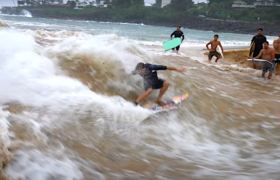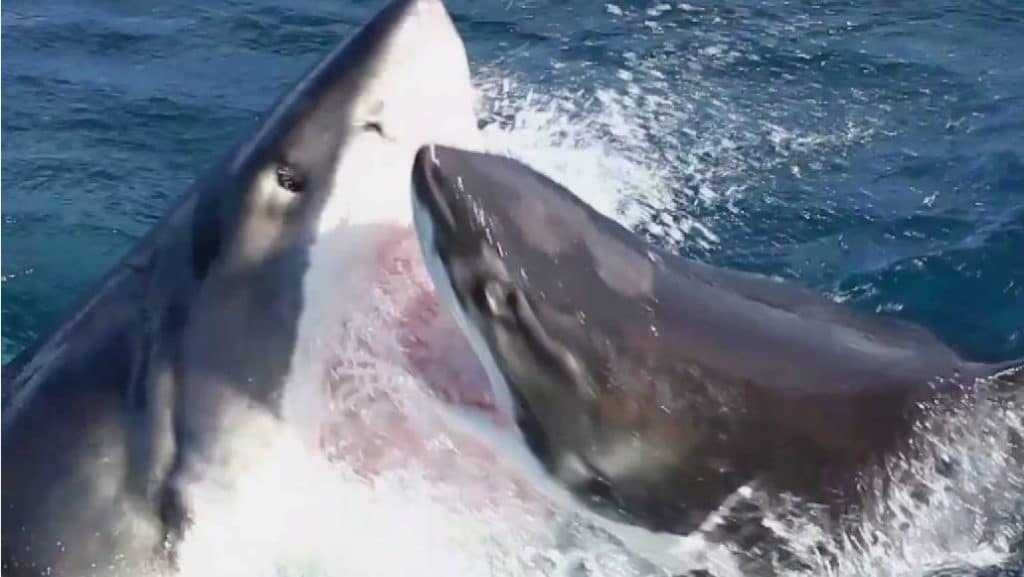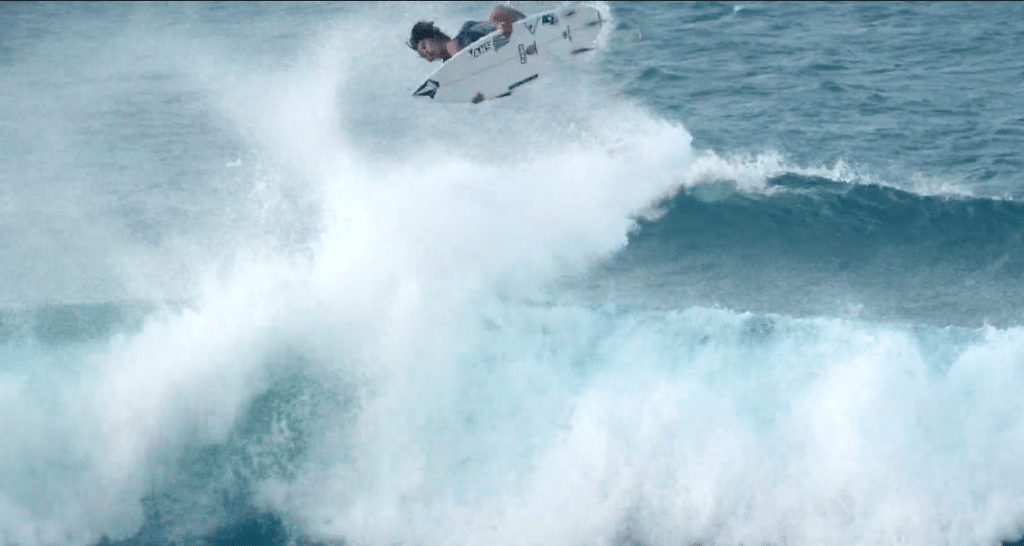Least it is when you live, and surf, on Reunion Island…
Have you ever wanted to dismantle the argument that cars are more dangerous than sharks, bee stings gonna gitcha, mosquitoes kill more people, etc?
The following opinion piece was written by Reunion Island surfer Jean François Nativel in response to a piece on The Inertia called Our Fear of Sharks Drives Me Completely Nuts. The Inert piece was a lazy three-hundred worder by Morgan Dunn and wheeled out the same ol tropes: sorry about the kid who bled out on the beach in WA but lightning strikes, heart disease, drowning etc.
Now, read, as Jean puts the kid to the sword in an open letter to The Inertia.
I was quite amazed to read Morgan Dunn’s article in your columns as it uses all sorts of dubious comparisons to show that fear of sharks is more a matter of fantasy than of reality.
On the planet’s scale (and for the US) it might be the case indeed, as the US has an extremely low mortality rate: for its 320 million inhabitants, 3.1 million surfers, millions of bathers, (including Hawaii) there has been only three deaths between 2011 and 2017.
But in shark attacks “hot spots” these kinds of arguments are stupid at best and intentionally misleading at worst.
In high-risk, unprotected places like Recife (Brazil), Ballina (Australia) or Reunion Island, the population is terrorised and fewer and fewer people are going in the water.
Reunion Island is the “best” example, since our tiny island counts nine deaths and five seriously maimed victims since 2011, while at the same time it’s been prohibited to swim or surf at most spots since 2013. Less than a few hundred people have dared to enter the water since the ocean’s ban and yet attacks and fatalities have kept increasing.
Now if you wish to compare Reunion Island with the United States, in relation to the number of their inhabitants, their coastal surface area, and most importantly the number of people at risk, then the US would have had thousands of deaths from shark attacks every year.
Conversely, if we had the same risk as in the US, we might have had one death every 400 years. The problem with conservationists/scientists & eco-moralists like Morgan Dunn, is when they get questioned by the media after an attack, they seek to downplay the risks by all means, using general considerations and clichés to explain the particulars of attacks in “hotspots”, where precisely none of the usual rules apply.
This dishonest attitude will, in turn, boost the number of would-be eco warriors to come and morbidly spread all these comparisons (even if they do not stand up to analysis). o this should also actually raise the issue of the moral responsibility of those (like Morgan Dunn) who use every tricks in the book (at each and every attack) to mislead public opinion so as to “side with the shark”.
It must be noted, though, that Morgan Dunn is not the one who came up with those ridiculous comparisons. In fact, they originated in the early 2000s from George Burgess himself (the “pope of sharks”), when he was asked to explain the resurgence of accidents in Florida. (Florida is experiencing 30 attacks a year on average, but nothing “too serious”: 1 death for 150 attacks “only”.)
Burgess had the brilliant idea to be inspired by a “Direct Club” advertisement (a travel insurance company) to ridicule the risk of deadly shark attacks with other far-fetched and totally unlikely risks, like falling coconuts.
These arguments can still be found on the website of the Museum of Natural History in Florida. How can such a scientific institution convey such misguided and disrespectful “arguments” towards victims, survivors, their families and their loved ones?
It was also during the same period that Burgess established its famous correlation between world’s population growths (and therefore ocean user’s growths) and the increase in the number of shark attacks. As previously stated, this might be true everywhere else in the world but not in shark attack “hotspots” (like Reunion Island), where more and more attacks happen even with fewer people in the water.
In conclusion, these arguments are dangerous because they contribute to disinformation and they lead thousands of hysterical Internet users (weak minds, lacking recognition and in search of something to do with their life) thinking of themselves as some sort of eco warriors to believe that they are on a mission to “save the planet from the apocalypse” by pitilessly harassing, blaming and challenging victims and small, bruised communities such as ours.
Then, to take up the many “arguments” of Morgan:
The recurring accusation of a responsibility of the movie Jaws is also a purely Western consideration. Around the world sharks are fished for food. Who can imagine that the poor fishermen of the African and Indian coasts fish for shark because of its bad reputation?
Why persist in denying the obvious: shark fishing is sustainable! Morgan’s publication also incorporates the classical amalgam with the “100 million sharks caught” in the world, which embodies a monumental social hypocrisy.
– There is absolutely no link between commercial and preventive fisheries
– There is no risk of threat to the species with preventive fishing (because it is only targeting dangerous and prolific predators).
It should be pointed out that preventative fishing is less than 1,500 sharks caught per year only (700 in Australia, 600 in South Africa and an average of 40 the last five years in Reunion) versus 76 million caught for consumption around the world.
Indeed, what interest is there to be so hypocritical for an activity that protects human lives and which only represents 1/50,000 of the world’s fishing effort of these animals?
Why are the actions of shark-lovers more focused on necessary preventive fisheries and its ridiculous impact rather than on the commercial fishery?
Each year there are 700,000 deaths in car accidents on the planet, so our island should have at least 100,000 deaths in car accidents to be able to compare the two phenomena with complete honesty. A study funded by the French government concluded that these were “manipulations of statistics” without any basis.
It is the same about the comparisons with lightning or car accidents.
Here, in Reunion Island, we are suffering 15 to 20% of the deadly sharks attacks of the whole world (two deaths out of the three in the world in 2017 happened on Reunion Island or 66%). To be able to compare with car accidents, it would also be necessary that 15 to 20% of car accidents of the planet occur on Reunion Island.
Each year there are 700,000 deaths in car accidents on the planet, so our island should have at least 100,000 deaths in car accidents to be able to compare the two phenomena with complete honesty. A study funded by the French government concluded that these were “manipulations of statistics” without any basis.
And no one questions these idiocies as they are still being used as truth to justify the unjustifiable and for the acceptance of the trivialisation of being devoured as an incompressible fatality.
About the risk of drowning, we also deal with an absolute bad faith. Hereunder is an arguing between two senators in the Australian parliament three weeks ago:
“Mr Peck replied there was an average of 14 (drownings) per year and answered in the negative when Senator Whish-Wilson asked if those deaths had resulted in “four days in a row of the first four pages of the newspaper (being) about those tragic drownings”.
Surfers have every reasons to be more afraid of sharks than drownings since they are true waterman: they are the ones who save the most people from drowning in the world.
We agree that great white sharks eat fatter preys like seals. But, for bull sharks and tiger sharks, human flesh is much richer than the fish species they feed off. The study of the forensic doctors shows that there are several tears and mutilations in the attacks in Reunion Island.
Please, stop talking about “exploratory bites”. Here in Reunion Island, the sharks eat and attack several times (three times on Alexandre on February 21, 2017, twice on Laurent on August 27, 2016).
We can not be for or against sharks.
It is a false debate: surfers are the greatest defenders of the environment. The protection of great white sharks, bull sharks, tiger sharks on popular beaches doesn’t mean that you are an environmental conservationist. That means that you are egoist and anti-humanist. There are 524 species of sharks, and some of them are dangerous. We are necessarily for sharks, for nature. On the other hand, we can not stand for the protection of predators, weighting between 300 kg and two tons, in human activities areas.
Many people try to reduce the debate to an “extermination”. Sharks are extremely clever. Fishing pressure could be enough to keep the predators at a good distance. Even though our beaches are still red with blood, those who use shark attacks for notoriety and donations say that “Shark culling is not working”, taking the example of Reunion Island.
It is totally dishonest to assert this for here there are still hundreds of people in the water. Preventive fishing obviously works, the protected places hit it in the world, and it is absolutely obvious: Removing 50 sharks out of 200 necessarily reduces the risk.







